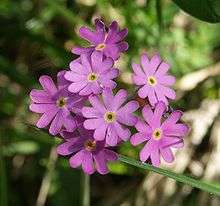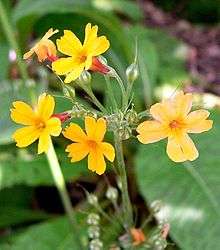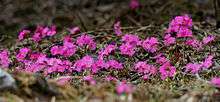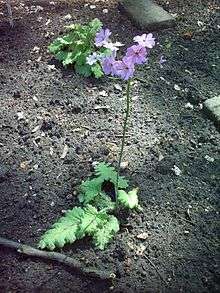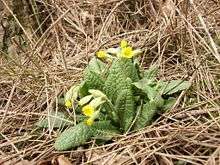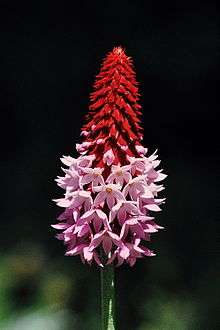Primula
Primula /ˈprɪmjʊlə/[1] is a genus of mainly herbaceous[2] flowering plants in the family Primulaceae. They include the familiar wildflower of banks and verges, the primrose (P. vulgaris). Other common species are P. auricula (auricula), P. veris (cowslip) and P. elatior (oxlip). These species and many others are valued for their ornamental flowers. They have been extensively cultivated and hybridised - in the case of the primrose, for many hundreds of years. Primula are native to the temperate northern hemisphere, south into tropical mountains in Ethiopia, Indonesia and New Guinea, and in temperate southern South America. Almost half of the known species are from the Himalayas.[2]
| Primula | |
|---|---|
| Primula vulgaris | |
| Scientific classification | |
| Kingdom: | Plantae |
| Clade: | Tracheophytes |
| Clade: | Angiosperms |
| Clade: | Eudicots |
| Clade: | Asterids |
| Order: | Ericales |
| Family: | Primulaceae |
| Subfamily: | Primuloideae |
| Genus: | Primula L. |
| Species | |
|
many; see text | |
| Wikimedia Commons has media related to Primula. |
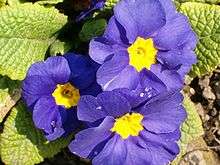
.jpg)
Primula has about 500 species in traditional treatments, and more if certain related genera are included within its circumscription.[3]
Description
Primula is a complex and varied genus, with a range of habitats from alpine slopes to boggy meadows. Plants bloom mostly during the spring, with flowers often appearing in spherical umbels on stout stems arising from basal rosettes of leaves; their flowers can be purple, yellow, red, pink, blue, or white. Some species show a white mealy bloom (farina) on various parts of the plant.[2] Many species are adapted to alpine climates.
Etymology
The word primula is the Latin feminine diminutive of primus, meaning first (prime), applied to flowers that are among the first to open in spring.[4]
Ecology
Primulas are used as a food plant by the Duke of Burgundy butterfly.[5]
Garden hybrids and cultivars
Primula species have been extensively cultivated and hybridised, mainly derived from P. elatior, P. juliae, P. veris and P. vulgaris. Polyanthus (often called P. polyantha) is one such group of plants, which has produced a large variety of strains in all colours, usually grown as annuals or biennials and available as seeds or young plants.[6]
The following hybrid varieties and cultivars have gained the Royal Horticultural Society's Award of Garden Merit:-[7]
Classification
The genus Dodecatheon originated from within Primula, so some authorities include the 14 species of Dodecatheon in Primula.[20]
Sections of genus Primula
The classification of the genus Primula has been investigated by botanists for over a century. As the genus is both large and diverse (with about 500 species), botanists have organized the species in various sub-generic groups. The most common is division into a series of thirty sections.[21][22] Some of these sections (e.g. Vernales, Auricula) contain many species; others contain only one.
|
|
|
Selected species
|
|
Hybrids
References
- Sunset Western Garden Book. 1995. 606–607.
- RHS A-Z Encyclopedia of Garden Plants. United Kingdom: Dorling Kindersley. 2008. p. 1136. ISBN 978-1405332965.
- Primula. Flora of North America.
- Coombes, Allen J. (2012). The A to Z of Plant Names. USA: Timber Press. pp. 312. ISBN 9781604691962.
- "UK Butterflies - Larval Foodplants".
- Reader's Digest Encyclopedia of Garden Plants & Flowers, 2nd edition. United Kingdom: Reader's Digest Association. 1978.
- "AGM Plants - Ornamental" (PDF). Royal Horticultural Society. July 2017. p. 81. Retrieved 14 May 2018.
- "RHS Plant Selector - Primula 'Crescendo Blue Shades'". Archived from the original on 15 May 2013. Retrieved 27 June 2013.
- "RHS Plant Selector - Primula 'Crescendo Bright Red'". Archived from the original on 15 May 2013. Retrieved 27 June 2013.
- "RHS Plant Selector - Primula 'Crescendo Golden'". Archived from the original on 15 May 2013. Retrieved 27 June 2013.
- "RHS Plant Selector - Primula 'Crescendo Pink and Rose Shades'". Archived from the original on 15 May 2013. Retrieved 27 June 2013.
- "RHS Plant Selector - Primula Danova Series". Archived from the original on 15 May 2013. Retrieved 27 June 2013.
- "RHS Plant Selector - Primula 'Danova Purple, White Edge'". Archived from the original on 15 May 2013. Retrieved 27 June 2013.
- "RHS Plant Selector - Primula 'Danova Rose'". Archived from the original on 15 May 2013. Retrieved 27 June 2013.
- "RHS Plant Selector - Primula 'Guinevere'". Archived from the original on 15 May 2013. Retrieved 27 June 2013.
- "RHS Plant Selector - Primula 'Rainbow Blue shades'". Archived from the original on 15 May 2013. Retrieved 27 June 2013.
- "RHS Plant Selector - Primula 'Rainbow Cream Shades'". Archived from the original on 15 May 2013. Retrieved 27 June 2013.
- "RHS Plant Selector - Primula 'Rainbow Scarlet Shades'". Archived from the original on 15 May 2013. Retrieved 27 June 2013.
- "RHS Plant Selector - Primula 'Wanda'". Archived from the original on 15 May 2013. Retrieved 27 June 2013.
- Weakley, A. S. (2008). "Flora of the Carolinas, Virginia, and Georgia, and Surrounding Areas". UNC Herbarium, North Carolina Botanical Garden, University of North Carolina at Chapel Hill.
- Ingwersen, Will (1986) [1978]. Ingwersen's Manual of Alpine Plants. Portland: Timber Press. ISBN 978-0-88192-026-0.
- Green, Roy (1986) [1976]. Asiatic Primulas. Woking, Surrey, UK: Alpine Garden Society.
- Primula: List of Records. Flora of China.
- Primula: List of Records. Flora of North America.
- GRIN Species Records of Primula. Archived 2015-09-24 at the Wayback Machine Germplasm Resources Information Network (GRIN).
- Basak, S. K. and G. G. Maiti. 2000. Primula arunachalensis sp. nov. (Primulaceae) from the Eastern Himalaya. Acta Phytotax. Geobot. 51(1) 11-15.
- Ming, H. C. and G. Y. Ying. (2003). Two new species of Primula (Primulaceae) from China. Novon 13 196-199.
- Xun, G. and F. Rhui-cheng. (2003). Primula calyptrata, a new species in section Carolinella (Primulaceae) from Yunnan, China. Novon 13 193-95.
- "The IUCN Red List of Threatened Species". IUCN Red List of Threatened Species. Retrieved 2018-11-15.
- Hu, C. M. and G. Hao. (2011). New and noteworthy species of Primula (Primulaceae) from China. Edinburgh Journal of Botany 68(2) 297.
- Li, R. and C. M. Hu. (2009). Primula lihengiana (Primulaceae), a new species from Yunnan, China. Annales Botanici Fennici 46(2) 130-32
- Rankin, David W. H. (2012). "726. Primula Melanantha". Curtis's Botanical Magazine. 29: 18–33. doi:10.1111/j.1467-8748.2012.01768.x.
- Rix, Martyn (2005). "529. Primula Moupinensis. Primulaceae". Curtis's Botanical Magazine. 22 (2): 119–123. doi:10.1111/j.1355-4905.2005.00477.x.
- "The IUCN Red List of Threatened Species". IUCN Red List of Threatened Species. Retrieved 2018-11-15.
- "The IUCN Red List of Threatened Species". IUCN Red List of Threatened Species. Retrieved 2018-11-15.
- "The IUCN Red List of Threatened Species". IUCN Red List of Threatened Species. Retrieved 2018-11-15.
- Chi-Ming, H. (1994). New taxa and combinations in Chinese Primulaceae. Novon 4(2) 103-105.
- Primula verticillata (yellow primrose). Archived 2012-09-05 at the Wayback Machine Royal Botanic Gardens, Kew.
- "Primula × polyantha". Germplasm Resources Information Network (GRIN). Agricultural Research Service (ARS), United States Department of Agriculture (USDA). Retrieved 12 December 2017.
External links
| Wikimedia Commons has media related to Primula. |

- Armeniapedia: Medicinal Uses of Primula
- American Primrose Society
